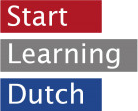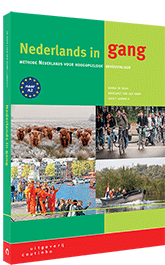Learn Dutch For Everyday
Conversations In The Netherlands
Dutch At Beginner Level
From Absolute Beginner To Dutch A2 Level
In the Start Learning Dutch courses for beginners (Beginner 1 + 2) you will focus on basic language skills and vocabulary. These ‘Social Dutch’ courses are designed for students who want to learn Dutch to survive in every day life, all within just a few weeks!
After the first weeks you will already be able to introduce yourself to your neighbors, greet someone, order a drink in a coffee place, and make an appointment with a friend. At the end of Beginner 2 you will have improved your listening and speaking skills. You will even be able to ask questions and participate in basic social conversations with your Dutch colleagues or in-laws in present, future or past tense!
Beginner courses:
Beginner 1 + 2
Entry level:
Absolute beginner (Beginner 1)
Goal:
In only 2 courses you will be working toward intermediate level A2 (on the Common European Framework of Reference)
What:
Online lessons in small groups up to 6 students; each course level consists of 12 x 2h15min classes, 1 lesson a week
Approximate self-study time:
2-3 hours a week
Who:
Students and professionals, such as expats and their partners, international students, and others who wish to learn Dutch fast and within a limited time frame. Students need to be able to speak English and have completed secondary education in their country of origin
Fee:
€575,-,- per course
When:
Click here for available course dates
Course materials:
Nederlands in gang, ISBN: 978 90 469 0560 9 (not included in the course fee)
Beginner 1 (A0 -> A1)
In this course you will learn how to:
- greet someone, and ask how someone is doing
- introduce yourself and tell about your family
- make an appointment, and give a reaction to an invitation
- ask someone over for dinner and go grocery shopping
- order a meal in a restaurant
- ask someone’s opinion about something
- go shopping and ask questions /answer questions in the shops
- describe your house and its surroundings
Grammar:
Conjugate verbs in present tense:
- Hij woont in Utrecht.
- Waar woon jij?
- Jullie wonen in een appartement.
Conjugate verbs in past tense (‘perfectum’):
- Ik heb vandaag hard gewerkt.
- Ik heb een jaar in China gewoond.
Place words in the correct order in a simple main sentence:
- Mijn naam is Elena.
- Woont je zus in Nederland?
Use personal and possessive pronouns:
- Ik heb een auto. Mijn auto is rood.
- Zij hebben vrienden in Italië. Hun vrienden wonen in Italië.
Use demonstrative pronouns:
- Dit shirt is groter dan dat shirt.
- Wil je deze broek of die broek?
Use adjectives:
- De koffie is lekker. We drinken lekkere koffie.
- Het boek is fantastisch. Ik lees een fantastisch boek.
Use modal verbs:
- Wat zullen we drinken? Ik wil graag een glas wijn.
Form comparative and superlative adjectives:
- Vind je rood mooier dan blauw? Ik vind groen het mooist.
Use the negative form:
- Ik koop geen boek.
- Ik zie het huis niet.
Beginner 2 (A1 -> A2)
In this course you will learn how to:
- make small talk at an informal meeting
- have a short chat about work, study, hobbies, and sports
- ask for directions or give directions
- tell about vacations and travels
- tell about your day, week, and weekend
- have a phone conversation
- describe a situation
Grammar:
Conjugate verbs in past tense (‘imperfectum’):
- Gisteren regende het niet.
- We fietsten naar het park.
Conjugate reflexive verbs:
- Hij voelt zich vandaag niet zo lekker.
Conjugate separable verbs:
- Ik werk morgen met mijn collega samen.
Place words in the correct order, combining two main clauses:
- Zij spreekt Engels en hij spreekt Nederlands.
Place words in the correct order, combining main and subordinate clauses:
- Ik ga op reis als ik tijd heb.
Choose the right conjunction:
- Ik ga naar huis, want ik ben moe.
- Ik ga naar huis, omdat ik moe ben.
Learn to speak Dutch well, online lessons via Zoom:
You will receive a Meeting ID (Personal Link) to participate in the correct online course on Zoom when you have signed up.


